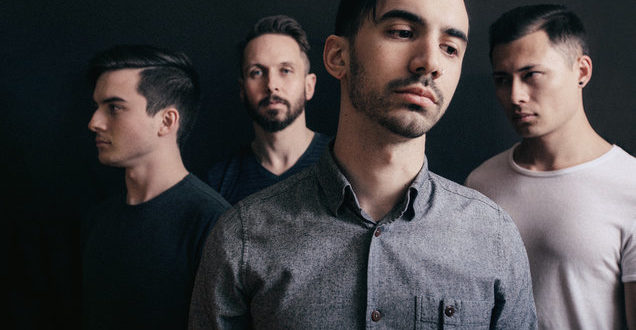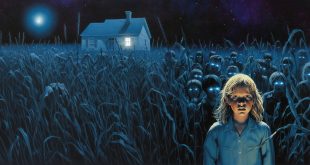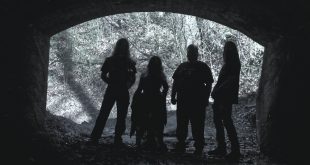Jonathan Wolfe has created a wealth of buzz around his latest endeavor, Vespera. The initially one-man band began in part because of a resonant quote by David Bowie, which promptly jolted Wolfe out of his artistic slump: “If you feel safe in the area that you’re working in,” he observed, “you’re not working in the right area. Always go a little further into the water than you feel you’re capable of being in. Go a little bit out of your depth, and when you don’t feel that your feet are quite touching the bottom, you’re just about in the right place to do something exciting.” Such exercise was implemented, and soon Vespera became a full-fledged quartet, featuring Cairn Tse-Lalonde on guitar, Paul Anderson on bass, and Jonathan Schwartz on drums. Their new album, The Thoughts That Plague You, will see release later this year.
I caught up with Wolfe to further discuss the genesis of Vespera, highlights of their new album, the essence of relationships, and his growth as a musician. Following Vespera’s success, Wolfe aims to continually express himself through as many personable and creative avenues as possible.
ME: You formed Vespera in response to a Bowie quote that went viral after his passing. Going back to that moment when it was announced, what were your initial feelings?
Jonathan: I was just shocked, honestly. It’s one of those things where you know it’s going to happen. The band didn’t come together since he’d passed away, though. This was already something that was on my mind, but then upon hearing about his passing and reading that quote, those things really resonated with me, and that’s how it actually began. To this day I’m still shocked, because he was someone I wanted to meet in my life who I could ask questions and get to know. Unfortunately, that won’t be the case now; all we have is his music.
ME: I’d imagine the moment that quote resonated with you, it was a case of, “There’s no turning back. This idea was bubbling in my mind, but now it’s out!”
Jonathan: Yeah, pretty much. It just gave me that final push. I’d been sitting around for a whole year just noodling around on guitar, and just figuring my life out. From that moment on, I just started moving forward. Those six months from his passing had just been a big blur, because I sat down and started writing for those six months straight.
ME: The project really began once you grabbed your guitar and started to experiment. With your endeavors in general, do you normally approach them from a type of self-taught, experimental angle?
Jonathan: I’m mainly self-taught but I also learned from other people. I’ve paid for lessons as a kid. When I went to school, I was in the jazz band, so I learned a lot of theory. You’d have to come from the self-taught angle as a guitarist, but I think I understand music as a whole. It’s a different language to me, if that makes sense.
ME: You’ve definitely encapsulated the best of both backgrounds.
Jonathan: That’s actually a good way to put it. I remember saying to myself that I’m just going to go out of the box. I’m going to use what I know, abandon that, and then do something completely different. If you’d listen to anything I’ve done before compared to Vespera, it’s a completely different thing (laughs).
ME: Clearly, this is a clean slate.
Jonathan: Yep! It doesn’t draw from my other bands at all. I mean, the only real similarity is the lyrical content. That’s always been very visceral and inward-thinking. I had always written from a psychological point of view when it comes to lyrics. It’s not about the stuff going on around me; it’s what’s going on in my head and what I think other people can relate to. But with the music, I decided to get a little more honest this time around – just a little deeper than before.
ME: Let’s talk a bit about the album, The Thoughts That Plague You. When would you say the album really started taking shape?
Jonathan: I’d say halfway into getting the record done. I recorded everything in about a week – the guitars bass and all the instrumentals. Then I sat there for the rest of the time to try to figure out the vocals for the album. Dude, I was nervous for a good minute! I was just like, “I don’t know what to do. I don’t know if this is gonna work,” and I’d sit there for days. There was a back room that I record vocals in and I wouldn’t leave for hours upon hours of time. I would pee in bottles (laughs)! I was just sitting there, focused, ready to get this done. But I think it really came together when I actually left the studio for a little bit. I came back to Seattle and sat in my own studio, just thought, listened to music, and at one point it all clicked. I put together like five songs in one day both lyrically and melodically. From that point on I was like, “OK, I think I’m onto something.”
ME: In a sense, that downtime was essential for being out of that whole environment. Did you find yourself listening to your influences to get inspired again and keep the juices flowing?
Jonathan: From time to time, but when I was in the studio, I mainly just listened to all my stuff. I’d pull away and listen to Tool to refresh my palate. But at the end of the day what I needed was to get out of the studio and just let my mind wander elsewhere. I think I sat for so many lengths of time that it kind of propagated my writer’s block. When I was out of there, I was at home, in my own environment and it’s completely different; another level of comfortable. Dude, the other place had no reservoir. You had to walk a mile just to be able to take a shower – it was the worst! But coming back home and being able to shower and be alone just made my life a lot easier (laughs)! While I wasn’t there, I just continued working on the next record.
ME: What it comes down to is being able to balance different avenues of creativity.
Jonathan: Yeah, I can do it all day. I love creating. That’s the one thing you should know about me. If I’m not doing vocals for a song, I’m creating instrumentals. I keep moving back and forth, and just keep painting on different canvases. I’ll work out one, and then when I come back to the other I’ll have a flurry of ideas!
ME: You worked with Taylor Larson on this record. How’d you initially meet him, and what is it about his style that really resonates with you?
Jonathan: Taylor and I met back in 2014. We were at two separate points but connected at the end of the tour I was doing with Falling In Reverse. He’d joined From First to Last and produced a record with them. We met in Arizona playing a show together, sat down and talked for a few hours back and forth about music, and I thought, “This guy’s awesome!” Years later, one thing kind of led to another and we find out that were working with each other. I guess it all came together from there. His recording quality is great; he’s one of the best mixers and masters out there now in this day and age.
Obviously, we all have a lot more to learn, but he holds a lot of potential and just keep going with it. He truly understands audio which is one thing that I struggle to find in the industry. A lot of people have a template they work off of, like, “Oh, this is how everything should sound,” but with every project, he changes it up which is nice. He works according to what the music is sonically speaking, and that’s what helps make the mixes unique. Dude, I think what people are paying him to record, he should be charging a lot more. He’s pretty damn good. I was just excited to work with someone who’s at least my level of production, so that the ideas would come out a little more solidly.
ME: A song on the album of particular note is “Deafening Dissonant,” which was the first time you’d recorded with a seven-string. Even before any real riff writing took place, did it feel any different just to hold and strum?
Jonathan: Yeah dude (laughs)! Now I’m used to it, but I remember picking one out back when I was younger especially with learning songs for the band Slave and I was just not about it. I was like, “Screw this! Give me a six-string.” But now I love it. I spent the past year writing with one, and the ideas kept flowing out. Just having that extra string made all the difference. It’s a little bit lower, but it helped evoke a mood that I couldn’t get with the six-string. I originally wrote half of these songs with the six-string, and then re-wrote them with the seven way after. I think the eight-string would be overkill for me, but an extra string right now is more than enough for me, so we’ll see.
ME: In general, when I notice about the seven-string is it provides a whole other sense of melody that you wouldn’t otherwise get.
Jonathan: Yep, absolutely! Back then when I would write with the same tuning, I’d be missing a whole string – that’s a whole 24 notes that I could use. And I actually used it a lot for much of the songs. So, that just made songwriting a lot more fun. If I had these really high notes and I wanted to go to the third octave below, I could do that, and it sounds great!
ME: Another song worthy of mention is “Bloom,” which was based on the endurance of the relationship with your girlfriend. How has that song inspired you on a personal level, especially considering all you’ve been through together?
Jonathan: It’s great because I’m finally with someone who works in the same industry. Both of us being part of that comes with an extra layer of understanding. Before, I dated someone who worked a 9 to 5, and I thought that would be a bit more feasible. But I noticed it could be hard for someone who wasn’t used to that kind of lifestyle. It’s not something you should expect out of any of your partners. It’s tough. When she has to go to Italy for three months, I have to be okay with that. It’s the same way where I may have to leave on tour and she has to be okay. And we are okay with it all.
“Bloom” is not so much about the struggles within the relationship. It’s the struggles before and leading to the relationship, and then us getting through that together. I had my fair share of bad things happen and so did she, and we came together after all the stuff that happened. We were just really involved with each other, and felt that this was great – like something we never have before. That’s what “Bloom” is really about, just getting through all of this together. Going back to our relationship, it’s great because I’m finally with someone who gets it. I can just disappear into my studio for 20 hours, and she understands that. We work well together, and that’s a good thing especially for what we do. There’s a lot of arguing that stems from the boyfriend or girlfriend being gone for so long. People get jealous, insecure, and all that kind of stuff. We get to a point where we’re just working and we come back home.
ME: Right. It’s all about patience, and having that basic foundation of respect, because at the end of the day, any insecurity you may have is arbitrary. You grow from that.
Jonathan: Absolutely. Patience is definitely a big part right there. If you don’t have any patience, you’re not going to make it. You’re not going to have a solid relationship with someone in this industry. Patience. It’s been my mantra for the past few years.
ME: Overall, what could you assess about the growth of your musicianship as a result of completing this album?
Jonathan: I’ll tell you this much. I still feel unfulfilled. But I’m really excited to work on the next record because it’s a little closer to what I want to create. I wrote this record by myself from top to bottom, but it was a starting point. I kind of reached this metamorphosis of being a musician in the middle of all this. It’s a change for me in the way that I hear music, perceive music, want to write it, and what I expect out of it. It changed me this much because I’ve been doing a lot of soul searching. You were asking earlier if it helps to listen to other music, and actually, I’ve watched a lot of music documentaries. That’s where I was pulling out my inspiration, because I wanted to understand something beyond the music. Doing that, it translated into my writing. I’m really proud of what I created, because for the first time ever, I can listen back to the record even with unedited vocals, which I have a lot of, and not cringe at the sound of my own voice. It’s more like, “I like the direction I’m heading in. Now, let’s amplify this.”
I’m just recording the ideas for the next record now, and hopefully start working on it in September or October, because we’d spend a lot of time on tour. This first record, I’m happy with it and stoked, but I’m and for filled because there’s so much more I wanted to do. I went in thinking it was going to do a five song EP originally, and I’d written eight songs. We couldn’t vote out two of them so I thought, “Why don’t I just write a few more?” Then everyone looked at me and said, “Yeah, could you do that?” Next thing you know, I’m writing a 10-song record. Two months later I spent time writing more songs, and then next thing you know, I end up with a 15-song record (laughs)! If time allowed me, I’d include more songs, but a step at a time, right?
ME: Lastly, anything you’d like to say to your fans?
Jonathan: The only thing I’d like to say at this point, and I understand this project is a new thing, but just join us in this journey because it’s a genuine one. We’re not doing this to earn fame or notoriety. We do this for more of a humble, heartfelt reason. We want to connect with people that may feel alone in life. You have all these things that you’re going through but not anyone to talk to about it. I want this record to be almost like therapy. You listen to the music, read the lyrics, and go, “Oh, I go through that to all the time,” like a feel-good record but in a different kind of way.
The main intent of this record is to connect listeners across these every day emotions, and say that they’re not alone. I hope the people push forward with us, because this is going to require more passion. We’re getting people who are passionate about music, the arts, and everything around us, because that’s the only way we are going to make it. I’m really trying to stay away from the labels. I don’t want to sell myself out to anyone and do this my own way. The only way to do that is by support of your fans – genuine, real support; not just the backing of the label. Our community thrives off the people in it. I’m just hoping to God that they understand with this truly is, and that they will back it. We have nothing but the best intentions.
Vespera Socials:
 Music Existence Because of Music, We Exist
Music Existence Because of Music, We Exist




